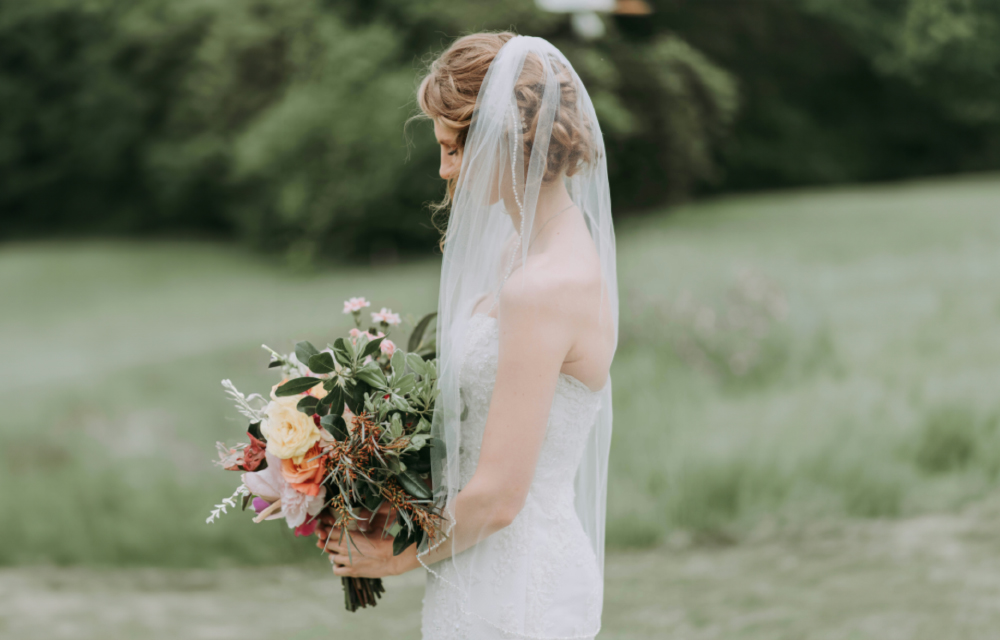O
ver the years, we’ve designed several websites for wedding venues — like the eco-friendly estate Twenty Mile House and a historic venue at our old office space, called The Hawthorn. So, we’ve learned a thing or two about the non-negotiable items that every venue should have on its website. Consider this a tried-and-true checklist of the most important pages, forms, and other elements that will transform your wedding venue website from a simple dot-com into a strategic and stunning marketing asset — one that will get newly engaged couples to fall in love at first click.
1. High-Quality Photography (and Video)
The number one element you can’t skip for your wedding website? Top-notch photography. A picture is worth a thousand words, after all, and photos from real weddings hosted at your venue will go a long way in convincing prospective couples that they can turn their dream wedding into a reality at your venue. Soon-to-weds want to envision what their future wedding could look like — from where their grand entrance will take place to the dance floor they’ll be taking to once they’ve said “I do.” Seeing what the property looks like in the daylight versus nighttime, and with various decor styles, can emphasize the versatility of your venue. We also recommend incorporating video footage on your site, which can serve to make your homepage hero more interactive and engaging than simple static imagery (check out Mankin Mansion’s website to see what we mean!).
2. An Overview of Spaces
You’ll want a dedicated landing page that dives deeper into each of the spaces available at your venue. From the bridal suite to ceremony and reception spaces, outline what prospective couples can expect in every corner of your property — and put those aforementioned high-resolution photos to use. You’ll also want your copy to really sing here. Is your venue romantic? Rustic? Modern? Historic? Convey the unique charm of these spaces with vivid, descriptive language that rivals the experience of an in-person venue tour.
3. Packages & Pricing Information
To show pricing or not to show pricing: that is the question! In general, we recommend that wedding website clients clearly define their packages — you certainly don’t want to drive away interested couples by burying your pricing, services, and package information on a hard-to-find corner of the website (or by not including it on your website at all). One useful strategy is to offer a brochure as gated content, meaning users will first provide basic contact information in order to download it. This way, you aren’t turning away potential clients in the initial awareness stage. They’ve had time to explore all your venue has to offer and get ready to take those next steps. (Psst: If you need help putting together an event brochure that converts, let’s talk!)
4. Glowing Reviews and Client Testimonials
Sure, you and your team know how fabulous your wedding venue is. But that alone may not be enough to convince soon-to-weds to select your venue. Prospective couples want to feel assured that your wedding venue is the absolute, number one right choice for them. What better way to convince them than with stories and testimonials from happy couples who tied the knot there themselves? Consider reaching out to couples a few weeks after their wedding and ask them to share their feedback — either on social media, Google Reviews, or websites like The Knot.
5. Clear Contact Information
You’ll need killer CTAs throughout your website, and in that same vein, you’ll need to make it abundantly clear how people can schedule a tour, download an event brochure, or book a consultation. In addition to CTAs strategically sprinkled on multiple landing pages, incorporate a contact page on your site so people can quickly learn how to get in touch with your team. You’d
Other Website Pages & Elements We Recommend:
- Our Story — This webpage can share how your venue came to be, introduce the people working behind-the-scenes to coordinate the celebrations, and give readers a glimpse into what makes your property unique (is it a historic building, for example?).
- Blog – A robust blog page can help drive traffic to your website, answer prospective couples’ questions, and show off your wedding industry expertise. If you want to publish regular trend-focused, SEO blog content, give us a shout — our in-house content writers are experts at whipping up blog copy that balances editorial storytelling with sales and marketing objectives.
- FAQs – Odds are, newly engaged couples clicking through your website are going to encounter a question or two about your venue. Do you have a preferred vendor list? How many guests can they invite? What’s your weather contingency plan for outdoor ceremonies? Address the questions you notice popping up again and again on an easy-to-find FAQ page.
A final note as you’re considering this checklist for your wedding venue website: Make sure you’re communicating your venue’s brand story and unique selling points at every turn. While this list can serve as a helpful guide, you ultimately know what makes your venue one-of-a-kind — and when you partner with an agency that knows how to turn your story into an aesthetic and engaging website, that’s when your venue’s marketing presence will truly shine.


